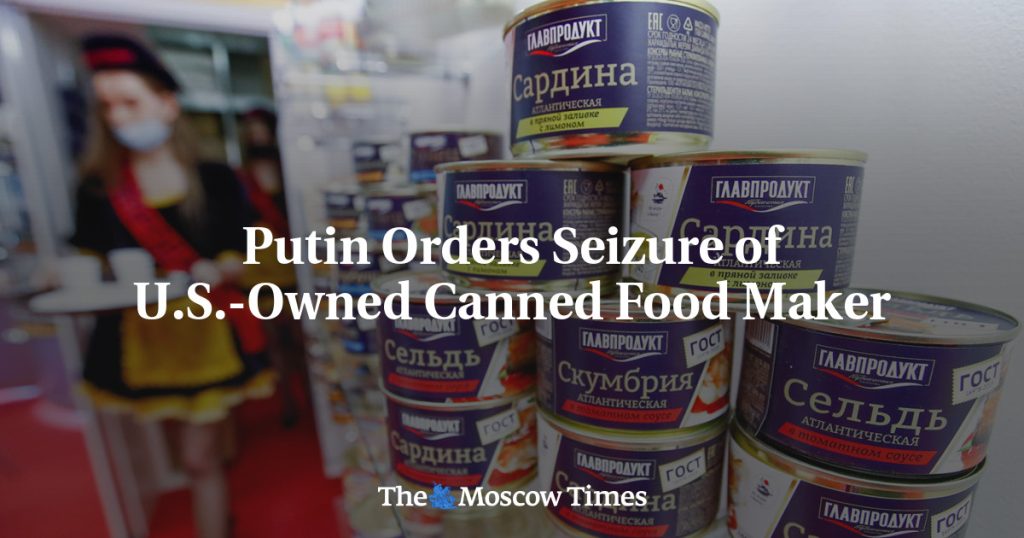President Vladimir Putin has signed a decree granting temporary control of a major canned food company to the Russian government. This move comes after Putin previously authorized the seizure of assets belonging to foreign companies from countries deemed “unfriendly” by Russia, in response to Western sanctions that froze around $300 billion in Russian state assets. The latest decree targets the Glavproduct holding company, its subsidiaries, and three canning plants, as well as its parent company, Promselkhozinvest, which is owned by U.S.-registered Universal Beverage Company. Universal Beverage is owned by Leonid Smirnov, a Russian-born U.S. businessman who returned to Russia in the 1990s after emigrating from the Soviet Union in the 1970s.
The Glavproduct holding company is described as Russia’s leading canned food producer, offering over 500 brands of products including canned meat, condensed milk, fish, and vegetables. The temporary government control of these seized assets will be overseen by Russia’s Federal Agency for State Property Management, Rosimushchestvo, as per Putin’s decree. This recent action is part of Russia’s ongoing response to the significant economic impact of Western sanctions imposed following the country’s 2022 invasion of Ukraine. The United States and the European Union have already blocked or seized more than $350 billion in state and personal assets, with EU member states agreeing to use frozen assets’ profits to support Ukraine by providing funds for arms and post-war reconstruction.
The decision to temporarily seize control of Glavproduct and its subsidiaries underscores Russia’s determination to protect its interests and assets in the face of Western sanctions. By targeting a major canned food producer, the Russian government is sending a clear message about its willingness to take decisive measures to counteract economic pressure from the West. The involvement of a prominent U.S.-registered company in this latest seizure raises questions about the potential impact on international business relations and foreign investment in Russia. The actions taken by Putin in response to Western sanctions highlight the escalating tensions between Russia and the West and the complexity of the global economic landscape.
The seizure of Glavproduct and its subsidiaries could have significant implications for the Russian canned food industry. With the government now in temporary control of the company’s assets, there could be disruptions to production, distribution, and supply chains that may impact consumers and the wider food market in Russia. The long-term consequences of this move on the country’s economy and business environment remain uncertain, as the full extent of the government’s control and its impact on Glavproduct’s operations is yet to be determined. As Russia continues to navigate the challenges posed by Western sanctions, the implications for its domestic industries and international trade relationships will be closely watched by global markets.
The involvement of a U.S.-owned company in the seizure of Glavproduct adds a layer of complexity to the situation, as it raises questions about the potential implications for American businesses operating in Russia. The actions taken by the Russian government could lead to increased scrutiny and potential repercussions for foreign companies with investments in the country, as tensions between Russia and the West continue to escalate. The broader geopolitical implications of these developments underscore the interconnectedness of the global economy and the ways in which political decisions in one country can reverberate across international markets and industries. The fallout from the ongoing conflict between Russia and the West is likely to have lasting effects on trade, investment, and business relationships.
As Russia asserts its control over Glavproduct and its subsidiaries, the impact on the country’s food industry and broader economic landscape remains to be seen. The government’s decision to seize control of a major canned food producer reflects its strategy to protect domestic industries and assets in the face of external pressure. The implications of this move for Russia’s standing in the global economy, as well as its relationships with foreign investors, are significant and will be closely monitored in the coming months. As tensions between Russia and the West continue to escalate, the repercussions of the ongoing conflict on trade, investment, and business operations will continue to be felt across international markets, highlighting the intricate interplay of politics, economics, and business in today’s interconnected world.


